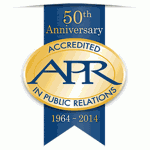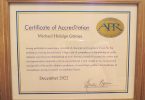 April is Accreditation month at PRSA!
April is Accreditation month at PRSA!
PRSA has designated April as Accreditation Month. Members can learn more about APR through many special events, including:
- The ROI on the APR Webinar – April 10, 2014; 3 – 4:30 p.m. EDT
- On Demand Webinars: Getting Ready for the Readiness Review, Getting Ready for the APR Computer-Based Examination, Accreditation Power Play
- Using the “Invite-a-Peer” tool to help spread the word about APR
- 50th Anniversary of APR Historical Milestones in Accreditation
- White Paper: Accreditation in Public Relations
The seconds in between finishing the computer-based Examination for Accreditation in Public Relations and seeing the unofficial results pop up on the screen were some of the most stressful seconds I’d experienced in a long time. Then I saw it — “Examination Results: Pass,” —and a sigh of relief and a strong sense of accomplishment waved over me.
I’m not going to sugarcoat it, earning the APR is hard, especially because most of us going through the process have demanding careers and personal commitments that don’t allow for much else to be crammed into our already packed schedules. However, it’s doable and I encourage other public relations professionals to give it a shot.
Here are some of my experiences and words of advice that might help you if you’re contemplating going through the process, or if you’re preparing for the Readiness Review or the Examination.
You’ll learn a lot.
This isn’t one of those certifications that you’ll never use. I learned some valuable information along the way, and brushed up on material I learned years ago. The best part is, I’m actually applying what I learned in my current job.
Get familiar with RPIE before your Readiness Review.
The Readiness Review demonstrates how you used the Research, Planning, Implementation and Evaluation (RPIE) process in a public relations plan. Read through the study guide and some extra readings first so that you really understand RPIE, and then put together your questionnaire, presentation and portfolio. If your plan lacks in one of the areas such as research, find a way to demonstrate that you know what it entails and that you could successfully execute it.
Don’t rely solely on the study guide.
The exam was really hard and tricky, and I second-guessed myself a lot. My forward and backward familiarity with the study guide didn’t help me with many of the questions because the Examination isn’t testing memorization; rather it tests your application of information through lots of case scenarios. I encourage you to study the guide in conjunction with some of the other suggested resources.
Get a study buddy.
I am the queen of procrastination and the last thing I want to do after a long day of work is work some more. So I found a friend who also was going through the process and we scheduled time to meet up. Even when we worked independently on our Readiness Review presentations, it was helpful to have someone who I was accountable to meeting each week, and it forced me to set aside study time.
I found the APR process to be challenging and stressful, but ultimately valuable and worthwhile. I would definitely recommend giving it a try. If I did it, I know you can too.
Mary Olsen, APR, has been in the communications career field for 10 years. She is currently the communications specialist at A.G. Rhodes Health & Rehab, a nonprofit organization operating three nursing homes in the Atlanta area. Mary has a master’s degree in communication from Johns Hopkins University, and a bachelor’s degree in public relations from the University of Georgia.






